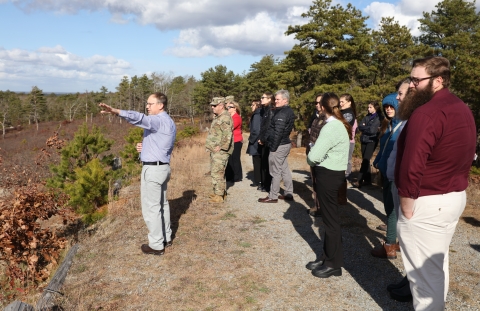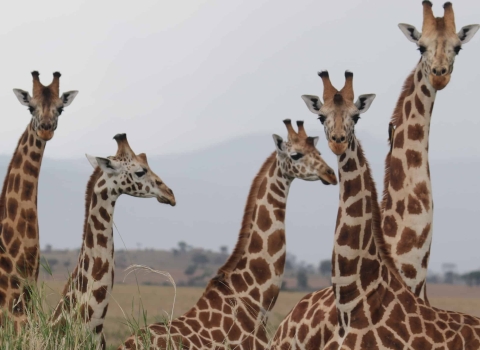On Friday, November 22, Camp Edwards was recognized for its outstanding contributions to natural resource management with the U.S. Fish and Wildlife Service's Northeast Region Military Conservation Partner Award.
Colonel John S. Bagaglio accepted the award in a ceremony at the installation on Cape Cod, Massachusetts, attended by members of the installation’s Natural Resources Office; the Assistant Secretary of the Army for Installations, Energy and Environment; the Deputy Assistant Secretary of the Army for Environment, Safety and Occupational Health and representatives from the U.S. Fish and Wildlife Service.
“We are proud of our strong partnership with Camp Edwards to conserve rare wildlife and habitats on Cape Cod,” said Wendi Weber, Regional Director of the Service’s Northeast Region. “The installation’s Natural Resources team is strategic and innovative, devoting significant time and effort to studying and managing species that need attention, while supporting military readiness.”
“I could not be prouder of Jake McCumber and the entire Natural Resources Team” said Colonel John S. Bagaglio, Garrison Commander of the Camp Edwards Training Site. “They excel at managing and expanding the habitat of several listed species while enhancing compatible military training. The entire Natural Resources Team continues to be innovative and discover solutions that can only be described as a win-win for the National Guard, the environment, and the Camp Edwards Training Site neighbors and stakeholders.”
Camp Edwards is the largest National Guard training area in the Northeast, often hosting thousands of soldiers on site each week. Located in a highly developed coastal area, the 15,000-acre installation also plays a vital role in regional conservation by protecting rare habitats, including the largest pine barrens system north of New Jersey.
The installation is currently home to 50 species that are protected under the Massachusetts Endangered Species Act — including several bats, birds, and moths — and one listed as endangered under the federal Endangered Species Act, the northern long-eared bat.
The Camp Edwards Natural Resources Office takes a proactive approach to conservation, supporting research and management actions that benefit species considered at-risk of steep declines, such as the frosted elfin butterfly and the eastern whip-poor-will.
Staff implement management activities that support military readiness while providing conservation benefits to wildlife resources — from managing a retired artillery range to provide habitat for the frosted elfin butterfly, to using prescribed fire both that maintains plant communities and creates safe training environments for soldiers.
These win-win management actions maintain healthy habitats while also reducing hazardous fuel loads that increase wildfire risk — a potential danger to military activities and the surrounding community. As a result of the stewardship provided by the military, Camp Edwards supports thriving populations of prairie warblers and eastern whip-poor-will that stands in stark contrast to observed declines occurring throughout most of their ranges.
As the largest known contiguous property that supports a population of New England cottontail, the installation has been a key partner in conserving this species. Working with the Service, the state, and others, Camp Edwards developed a New England cottontail-focused restoration plan involving prescribed fire and forestry, contributing to proactive conservation efforts that informed the decision in 2015 that listing the species under the Endangered Species Act was not warranted.
In addition to managing fish and wildlife resources on base, Camp Edwards provides high-value outdoor recreation programs to the public and Veterans, including hunting and camping opportunities, guided tours, and bird walks that showcase conservation successes and connect people to nature.
By prioritizing relationships with partners and the public, the Camp Edwards Natural Resources Office has achieved conservation outcomes that depend upon effective coordination and communication.
“I want to the thank U.S. Fish and Wildlife for recognizing Camp Edwards as the 2024 Northeast Region Military Conservation Partner,” said Col. Bagaglio. “Too often, the public perceives military bases and facilities to be blind to environmental issues. This just isn’t the case, especially with Camp Edwards and the Massachusetts National Guard. We’re honored to be recognized for the outstanding work our environmental team does every day ensure our precious resources are safeguarded.”
Across the nation, the Service works with military partners to recover listed species, restore fish and wildlife habitat, manage invasive species invasive species
An invasive species is any plant or animal that has spread or been introduced into a new area where they are, or could, cause harm to the environment, economy, or human, animal, or plant health. Their unwelcome presence can destroy ecosystems and cost millions of dollars.
Learn more about invasive species , and enhance recreational opportunities for the public.
The Northeast Region established the Regional Military Conservation Partner award in 2021 to recognize military installations like Camp Edwards for their outstanding work to conserve important wildlife and their habitats on military land.




